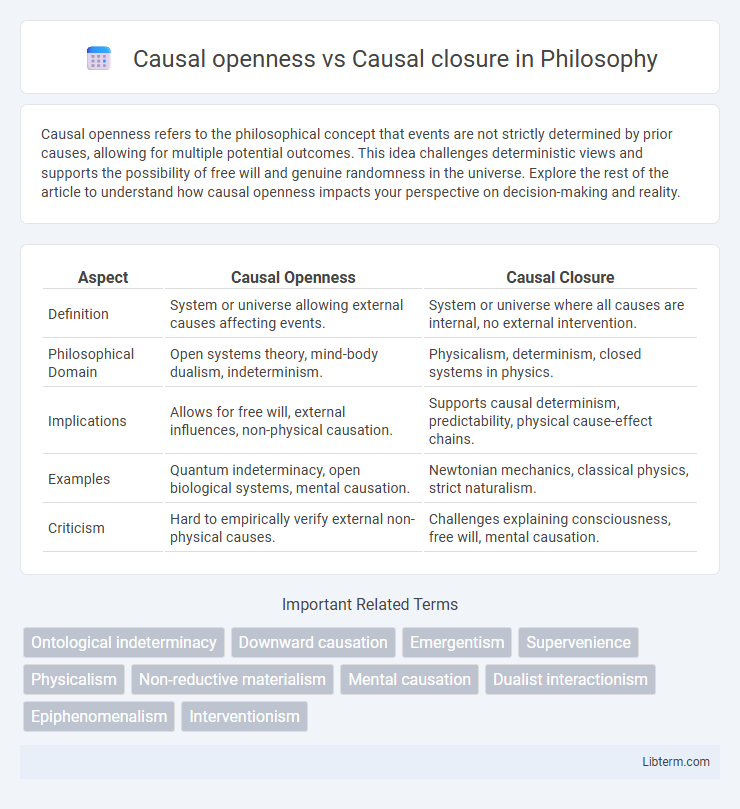Causal openness refers to the philosophical concept that events are not strictly determined by prior causes, allowing for multiple potential outcomes. This idea challenges deterministic views and supports the possibility of free will and genuine randomness in the universe. Explore the rest of the article to understand how causal openness impacts your perspective on decision-making and reality.
Table of Comparison
| Aspect | Causal Openness | Causal Closure |
|---|---|---|
| Definition | System or universe allowing external causes affecting events. | System or universe where all causes are internal, no external intervention. |
| Philosophical Domain | Open systems theory, mind-body dualism, indeterminism. | Physicalism, determinism, closed systems in physics. |
| Implications | Allows for free will, external influences, non-physical causation. | Supports causal determinism, predictability, physical cause-effect chains. |
| Examples | Quantum indeterminacy, open biological systems, mental causation. | Newtonian mechanics, classical physics, strict naturalism. |
| Criticism | Hard to empirically verify external non-physical causes. | Challenges explaining consciousness, free will, mental causation. |
Understanding Causal Openness and Causal Closure
Causal openness refers to systems where external influences can affect the internal state, allowing interactions across boundaries and introducing unpredictability. Causal closure describes systems closed to external causal influences, where every event is fully determined by internal causes according to physical laws. Understanding causal openness versus causal closure is crucial for fields like philosophy of mind, physics, and systems theory, as it shapes perspectives on determinism, free will, and system boundaries.
Historical Background of Causal Closure
Causal closure originated in early 20th-century philosophy of science, particularly through the works of philosophers like Bertrand Russell and W.V.O. Quine, who emphasized the closed nature of physical causation. This principle asserts that every physical event has a sufficient physical cause, forming the foundation for physicalism and materialism in metaphysics. Causal closure contrasts with causal openness by limiting causal interactions to a single, physically closed domain, shaping debates on determinism and the mind-body problem.
The Emergence of Causal Openness in Philosophy
The emergence of causal openness in philosophy challenges the traditional view of causal closure, which holds that every physical event has a sufficient physical cause. This perspective emphasizes the role of non-physical influences, such as mental states or quantum events, in shaping physical outcomes, suggesting a more complex interaction between mind and matter. Philosophers exploring causal openness argue it better accounts for phenomena like consciousness and free will, promoting a pluralistic understanding of causality beyond strict physical determinism.
Key Principles of Causal Closure
Causal closure posits that every physical event has a sufficient physical cause within a closed physical system, ensuring no causal influence from non-physical entities. This principle underpins physicalism by asserting that all causal interactions are confined to the physical domain, excluding supernatural or mental causes from altering physical states. Key formulations emphasize methodological naturalism and the non-intervention of external forces, reinforcing the integrity of physical laws in explaining phenomena.
Fundamental Aspects of Causal Openness
Causal openness refers to systems where interactions with external factors influence their state and behavior, allowing for dynamic adaptation and evolution. Fundamental aspects of causal openness include the permeability of system boundaries, the integration of external causal agents, and the inherent unpredictability due to external inputs. This contrasts with causal closure, where all causes are contained within the system, emphasizing isolation and determinism.
Causal Closure in Physicalism and Naturalism
Causal closure in physicalism asserts that every physical event has a sufficient physical cause, underpinning the principle that no non-physical entities influence the physical world, thereby maintaining a self-contained causal system. This concept is fundamental to naturalism, which holds that all phenomena can be explained through natural causes and laws without invoking supernatural elements. The commitment to causal closure challenges dualistic or supernatural explanations by restricting causal interactions to the physical domain, reinforcing a scientifically grounded worldview.
Causal Openness in Mind-Body Debates
Causal openness in mind-body debates emphasizes that mental states can influence physical processes, challenging the notion of strict physical determinism inherent in causal closure. This perspective supports mental causation by arguing that non-physical minds have genuine causal powers that affect brain activity and behavior. Research in neuroscience and philosophy highlights how consciousness and intention shape neural dynamics, reinforcing arguments against a causally closed physical system.
Major Arguments for Causal Closure
Causal closure posits that every physical event has a sufficient physical cause, emphasizing that no non-physical influences alter physical processes. Major arguments for causal closure include the empirical success of physical sciences, which consistently explain phenomena without invoking non-physical causes, and the principle of causal completeness that maintains the physical domain is causally self-contained. This doctrine underpins physicalism by asserting that mental events must supervene on or be reducible to physical causation, challenging dualist perspectives that posit causal openness.
Criticisms and Challenges to Causal Closure
Causal closure, the principle that physical events are fully determined by physical causes, faces criticism for its exclusion of non-physical influences such as mental states or consciousness. Challenges to causal closure highlight difficulties in accounting for phenomena like free will, intentionality, and subjective experience within a strictly physicalist framework. Critics argue that this stance may oversimplify causation by ignoring emergent properties and interdisciplinary interactions present in complex systems.
Implications of Causal Openness vs Causal Closure
Causal openness implies that systems can be influenced by external factors beyond their boundaries, allowing for the introduction of new variables and unpredictability in outcomes. In contrast, causal closure assumes all causal interactions occur within the system, leading to deterministic predictions and internal consistency. The implications of causal openness include enhanced adaptability and complexity in systems analysis, whereas causal closure supports rigorous scientific modeling and reproducibility.
Causal openness Infographic

 libterm.com
libterm.com